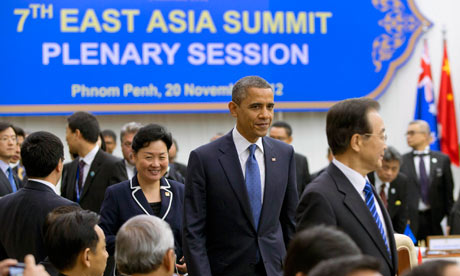បន្ទាប់ពីចៅក្រម បានសម្រេចផ្តន្ទាទោសដាក់ពន្ធនាគារ ៣ ឆ្នាំ លើស្ត្រីអ្នកតវ៉ាដីធ្លី នៅបឹងកក់ អ្នកស្រី យ៉ោម បុប្ផា កាលពីព្រឹកថ្ងៃព្រហស្បតិ៍នេះ ក្រុមប្រជាពលរដ្ឋបឹងកក់ ដែលបានប្រមូលផ្តុំនៅមុខរបាំងដែក រាំងផ្លូវរបស់ប៉ូលិស នៅចំណុចភ្លើងស្តុប នាងគង្ហីង ខាងជើងស្តាតអូឡាំពិក បានយំសោក ស្រែករកយុត្តិធម៌។ អ្នកតវ៉ា ក៏ចង់ទម្លុះរបាំងប៉ូលិស ចូលទៅកាន់តុលាការ តែត្រូវកម្លាំងប៉ូលិសប្រដាប់ដោយដំបង ខែល ដើម្បីបង្ក្រាបបាតុកម្ម បានរារាំង។
ចំណែកនៅឯម្ខាងទៀត នៅចំណុចរបាំងដែកបិទផ្លូវ នៅភ្លើងស្តុបអាងទឹក គឺក្រុមអ្នករត់ម៉ូតូឌុប ដែលគាំទ្របុរសពីរនាក់ ដែលគេអះអាងថា ជាជនរងគ្រោះ អ្នករត់ឌុប បានសម្តែងការសាទរទៅនឹងសេចក្តីសម្រេចរបស់តុលាការ។
នៅព្រឹកមិញ ក្រៅពីផ្តន្ទាទោសលើអ្នកស្រី យ៉ោម បុប្ផា ក្នុងសំណុំរឿងក្តី ព្រួយគ្នាវាយទៅលើអ្នករត់ម៉ូតូឌុបពីរនាក់នោះ គឺចៅក្រម ក៏បានសម្រេចផ្តន្ទាទោសកំបាំងមុខ លើបងប្អូនប្រុសពីរនាក់ របស់អ្នកស្រី យ៉ោម បុប្ផា ដាក់ពន្ធនាគារ ៣ ឆ្នាំផងដែរ។ ប៉ុន្តែបុរសទាំងពីរនោះ បានគេចខ្លួន តាំងពីថ្ងៃកើតហេតុ។ រីឯប្តីរបស់អ្នកស្រី យ៉ោម បុប្ផា ក៏ត្រូវចៅក្រម ប្រកាសផ្តន្ទាទោសចំពោះមុខ ដាក់ពន្ធនាគារ ៣ ឆ្នាំដែរ តែទោសនោះ ត្រូវព្យួរ។ មានន័យថា ប្តីរបស់អ្នកស្រី យ៉ោម បុប្ផា មិនត្រូវបានចាប់ឃុំខ្លួនជាមួយនឹងអ្នកស្រី យ៉ោម បុប្ផាទេ។ ចៅក្រម ក៏បានតម្រូវឲ្យជនជាប់ចោទទាំង៤នាក់ រួមគ្នា សងជំងឺចិត្តដល់អ្នករត់ម៉ូតូឌុប រងគ្រោះទាំងពីរនាក់ ចំនួន ៣០ លានរៀល ក្នុងម្នាក់ៗ។
លោក សួស សាខុន ប្តីរបស់អ្នកស្រី យ៉ោម បុប្ផា ដែលឈរនៅជិតកូនតូច បានចាត់ទុកការកាត់ក្តីរបស់តុលាការថា ធ្វើឡើងដោយអយុត្តិធម៌ ហើយលោក នឹងដាក់ពាក្យបណ្តឹងឧទ្ធរណ៍ ជំទាស់នឹងការសម្រេចក្តីរបស់ចៅក្រមដូច្នេះ។
លោក សួស សាខុន បានបញ្ជាក់ថា “ពាក្យបណ្តឹងនៅប៉ុស្តិ៍ប៉ូលិសស្រះចក ជនរងគ្រោះនិយាយផ្សេង ហើយពេលចៅក្រម ហៅមកសាកសួរ និយាយផ្សឹង ហើយម្សិលមិញ ថ្ងៃទី២៦ធ្នូ នៅក្នុងសវនាការ ជនរងគ្រោះនិយាយផ្សេងទៀត តែតុលាការហាក់ដូចជាគ្មានចំណាប់អារម្មណ៍ គិតគូថា ជនរងគ្រោះ និងសាក្សី និយាយខុសគ្នានោះសោះ"។ "ជនរងគ្រោះ និងសាក្សីជនរងគ្រោះ និយាយមក វាអត់ដូចគ្នា។ ខុសទាំងពេលវេលា ខុសទាំងហេតុការណ៍។ ចំណែកខ្ញុំ និងប្រពន្ធខ្ញុំ ត្រូវបានជនរងគ្រោះ (អ្នករត់ម៉ូតូឌុបទាំងពីរនាក់) បាននិយាយថា មិនពាក់ព័ន្ធក្នុងរឿងហ្នឹងទេ។ តែតុលាការនៅតែថា មានសាក្សី ដែលបានឮអ្នកនេះថា ឮអ្នកនោះថា ដោយមិនបានឃើញនឹងភ្នែកពិតប្រាកដ។ ដល់អីចឹងទៅ គេយកអំណះអំណាងនោះ ដើម្បីមកដាក់ទោសខ្ញុំ និងប្រពន្ធខ្ញុំ ហើយបង្គាប់ឲ្យសង ៣០ លានរៀលម្នាក់ ទៅកាន់ជនរងគ្រោះ”។
ចំណែកលោក អ៊ូ វីរៈ ប្រធានមជ្ឈមណ្ឌលសិទ្ធិមនុស្សកម្ពុជា ដែលចូលតាមដានសវនាការ លើករណីតុលាការកាត់ទោសអ្នកស្រី យ៉ោម បុប្ផា ក៏បានសម្តែងការខកចិត្ត ដោយលោកចាត់ទុកថា ជារឿងអយុត្តិធម៌។
សកម្មជនសិទ្ធិមនុស្ស លោក អ៊ូ វីរៈ បានមានប្រសាសន៍ថា "រឿងនេះ ជារឿងអយុត្តិធម៌មែនទែន ដោយសារជនរងគ្រោះទាំងពីររូប ( អ្នករត់ម៉ូតូឌុប ) និងសាក្សីទាំងអស់ ឆ្លើយខុសៗគ្នាសឹងទាំងអស់ ហើយខុសគ្នាច្រើនមែនទែន។ រឿងខ្លះ យើងមើលទៅប្រឌិតតែម្តង ហើយរឿងខ្លះ យើងមើលទៅមានអ្នកប្រឌិតឲ្យ គឺមានអ្នកប្រាប់ឲ្យនិយាយទៀត។ គ្នាភ័យចង់ងាប់ នៅក្នុងសវនាការ ពិសេសជនរងគ្រោះទាំងពីររូប ឆ្លើយខុសគ្នា ហើយភ័យញ័រសាច់។ ខ្ញុំមើលទៅអ្នកទាំងពីរនាក់នោះ កុហក់ ដោយគេជួយប្រាប់ឲ្យកុហក់"។
សូមរម្លឹកថា កាលពីរសៀលថ្ងៃទី២៦ ខែធ្នូ ឆ្នាំ២០១២ តុលាការសាលាដំបូងរាជធានីភ្នំពេញ បានបើកសវនាការជំនុំជម្រះ លើសំណុំរឿងក្តីពីរផ្សេងគ្នា ប្រឆាំងនឹងអ្នកស្រី យ៉ោម បុប្ផា សកម្មជនតវ៉ាដីធ្លី នៅបឹងកក់ និងរឿងក្តីមួយទៀត ប្រឆាំងនឹងអ្នកស្រី ទឹម សាក់មុន្នី ស្ត្រីអ្នកតវ៉ាដីធ្លី នៅបូរីកីឡា។
អ្នកស្រី យ៉ោម បុប្ផា មានអាយុ ២៩ ឆ្នាំ ត្រូវបានចាប់ខ្លួន នៅថ្ងៃទី៤ ខែកញ្ញា ឆ្នាំ២០១២ ពីបទចោទប្រកាន់ថា បានប្រើអំពើហិង្សា ដោយចេតនា តាមរយៈការវាយលើបុរសអ្នករត់ម៉ូតូឌុបពីរនាក់ ឲ្យរងរបួស។
ចំណែកអ្នកស្រី ទឹម សាក់មុន្នី អ្នកតវ៉ាដីធ្លី នៅបុរីកីឡា អាយុ ៦៤ ឆ្នាំ ត្រូវបានចាប់ខ្លួន កាលពីថ្ងៃទី៥ ខែកញ្ញា ឆ្នាំ២០១២ ក្រោមការចោទប្រកាន់ពីបទ ញុះញង់ ឲ្យប្រព្រឹត្តបទឧក្រិដ្ឋ តាមពាក្យបណ្តឹងរបស់ក្រុមហ៊ុន ផានអ៊ីម៉ិច ដែលទទួលបានសិទ្ធិអភិវឌ្ឍន៍ផ្ទះល្វែង នៅបុរីកីឡា។
ក៏ប៉ុន្តែចៅក្រមតុលាការសាលាដំបូង រាជធានីភ្នំពេញ បន្ទាប់ពីបើកសវនាការ កាលពីរសៀលថ្ងៃទី២៦ ខែធ្នូ បានប្រកាសសាលក្រម ផ្តន្ទាទោសអ្នកស្រី ទឹម សាក់មុន្នី ដាក់ពន្ធនាគារ ៦ ខែ តែអនុវត្តទោសត្រឹមតែ ៣ ខែ ២១ ថ្ងៃ ដែលជាពេលវេលាអ្នកស្រី ទឹម ជាប់ឃុំឃាំង រីឯទោសនៅសល់ប៉ុន្មាន ត្រូវព្យួរ។ ពោលគឺចៅក្រមបានកាត់តម្រឹមទោស ហើយដោះលែង អ្នកស្រី ទឹម សាក់មុន្នី ចេញពីពន្ធនាគារព្រៃស កាលពីព្រលប់ថ្ងៃពុធម្សិលមិញ៕
ចំណែកនៅឯម្ខាងទៀត នៅចំណុចរបាំងដែកបិទផ្លូវ នៅភ្លើងស្តុបអាងទឹក គឺក្រុមអ្នករត់ម៉ូតូឌុប ដែលគាំទ្របុរសពីរនាក់ ដែលគេអះអាងថា ជាជនរងគ្រោះ អ្នករត់ឌុប បានសម្តែងការសាទរទៅនឹងសេចក្តីសម្រេចរបស់តុលាការ។
នៅព្រឹកមិញ ក្រៅពីផ្តន្ទាទោសលើអ្នកស្រី យ៉ោម បុប្ផា ក្នុងសំណុំរឿងក្តី ព្រួយគ្នាវាយទៅលើអ្នករត់ម៉ូតូឌុបពីរនាក់នោះ គឺចៅក្រម ក៏បានសម្រេចផ្តន្ទាទោសកំបាំងមុខ លើបងប្អូនប្រុសពីរនាក់ របស់អ្នកស្រី យ៉ោម បុប្ផា ដាក់ពន្ធនាគារ ៣ ឆ្នាំផងដែរ។ ប៉ុន្តែបុរសទាំងពីរនោះ បានគេចខ្លួន តាំងពីថ្ងៃកើតហេតុ។ រីឯប្តីរបស់អ្នកស្រី យ៉ោម បុប្ផា ក៏ត្រូវចៅក្រម ប្រកាសផ្តន្ទាទោសចំពោះមុខ ដាក់ពន្ធនាគារ ៣ ឆ្នាំដែរ តែទោសនោះ ត្រូវព្យួរ។ មានន័យថា ប្តីរបស់អ្នកស្រី យ៉ោម បុប្ផា មិនត្រូវបានចាប់ឃុំខ្លួនជាមួយនឹងអ្នកស្រី យ៉ោម បុប្ផាទេ។ ចៅក្រម ក៏បានតម្រូវឲ្យជនជាប់ចោទទាំង៤នាក់ រួមគ្នា សងជំងឺចិត្តដល់អ្នករត់ម៉ូតូឌុប រងគ្រោះទាំងពីរនាក់ ចំនួន ៣០ លានរៀល ក្នុងម្នាក់ៗ។
លោក សួស សាខុន ប្តីរបស់អ្នកស្រី យ៉ោម បុប្ផា ដែលឈរនៅជិតកូនតូច បានចាត់ទុកការកាត់ក្តីរបស់តុលាការថា ធ្វើឡើងដោយអយុត្តិធម៌ ហើយលោក នឹងដាក់ពាក្យបណ្តឹងឧទ្ធរណ៍ ជំទាស់នឹងការសម្រេចក្តីរបស់ចៅក្រមដូច្នេះ។
លោក សួស សាខុន បានបញ្ជាក់ថា “ពាក្យបណ្តឹងនៅប៉ុស្តិ៍ប៉ូលិសស្រះចក ជនរងគ្រោះនិយាយផ្សេង ហើយពេលចៅក្រម ហៅមកសាកសួរ និយាយផ្សឹង ហើយម្សិលមិញ ថ្ងៃទី២៦ធ្នូ នៅក្នុងសវនាការ ជនរងគ្រោះនិយាយផ្សេងទៀត តែតុលាការហាក់ដូចជាគ្មានចំណាប់អារម្មណ៍ គិតគូថា ជនរងគ្រោះ និងសាក្សី និយាយខុសគ្នានោះសោះ"។ "ជនរងគ្រោះ និងសាក្សីជនរងគ្រោះ និយាយមក វាអត់ដូចគ្នា។ ខុសទាំងពេលវេលា ខុសទាំងហេតុការណ៍។ ចំណែកខ្ញុំ និងប្រពន្ធខ្ញុំ ត្រូវបានជនរងគ្រោះ (អ្នករត់ម៉ូតូឌុបទាំងពីរនាក់) បាននិយាយថា មិនពាក់ព័ន្ធក្នុងរឿងហ្នឹងទេ។ តែតុលាការនៅតែថា មានសាក្សី ដែលបានឮអ្នកនេះថា ឮអ្នកនោះថា ដោយមិនបានឃើញនឹងភ្នែកពិតប្រាកដ។ ដល់អីចឹងទៅ គេយកអំណះអំណាងនោះ ដើម្បីមកដាក់ទោសខ្ញុំ និងប្រពន្ធខ្ញុំ ហើយបង្គាប់ឲ្យសង ៣០ លានរៀលម្នាក់ ទៅកាន់ជនរងគ្រោះ”។
ចំណែកលោក អ៊ូ វីរៈ ប្រធានមជ្ឈមណ្ឌលសិទ្ធិមនុស្សកម្ពុជា ដែលចូលតាមដានសវនាការ លើករណីតុលាការកាត់ទោសអ្នកស្រី យ៉ោម បុប្ផា ក៏បានសម្តែងការខកចិត្ត ដោយលោកចាត់ទុកថា ជារឿងអយុត្តិធម៌។
សកម្មជនសិទ្ធិមនុស្ស លោក អ៊ូ វីរៈ បានមានប្រសាសន៍ថា "រឿងនេះ ជារឿងអយុត្តិធម៌មែនទែន ដោយសារជនរងគ្រោះទាំងពីររូប ( អ្នករត់ម៉ូតូឌុប ) និងសាក្សីទាំងអស់ ឆ្លើយខុសៗគ្នាសឹងទាំងអស់ ហើយខុសគ្នាច្រើនមែនទែន។ រឿងខ្លះ យើងមើលទៅប្រឌិតតែម្តង ហើយរឿងខ្លះ យើងមើលទៅមានអ្នកប្រឌិតឲ្យ គឺមានអ្នកប្រាប់ឲ្យនិយាយទៀត។ គ្នាភ័យចង់ងាប់ នៅក្នុងសវនាការ ពិសេសជនរងគ្រោះទាំងពីររូប ឆ្លើយខុសគ្នា ហើយភ័យញ័រសាច់។ ខ្ញុំមើលទៅអ្នកទាំងពីរនាក់នោះ កុហក់ ដោយគេជួយប្រាប់ឲ្យកុហក់"។
សូមរម្លឹកថា កាលពីរសៀលថ្ងៃទី២៦ ខែធ្នូ ឆ្នាំ២០១២ តុលាការសាលាដំបូងរាជធានីភ្នំពេញ បានបើកសវនាការជំនុំជម្រះ លើសំណុំរឿងក្តីពីរផ្សេងគ្នា ប្រឆាំងនឹងអ្នកស្រី យ៉ោម បុប្ផា សកម្មជនតវ៉ាដីធ្លី នៅបឹងកក់ និងរឿងក្តីមួយទៀត ប្រឆាំងនឹងអ្នកស្រី ទឹម សាក់មុន្នី ស្ត្រីអ្នកតវ៉ាដីធ្លី នៅបូរីកីឡា។
អ្នកស្រី យ៉ោម បុប្ផា មានអាយុ ២៩ ឆ្នាំ ត្រូវបានចាប់ខ្លួន នៅថ្ងៃទី៤ ខែកញ្ញា ឆ្នាំ២០១២ ពីបទចោទប្រកាន់ថា បានប្រើអំពើហិង្សា ដោយចេតនា តាមរយៈការវាយលើបុរសអ្នករត់ម៉ូតូឌុបពីរនាក់ ឲ្យរងរបួស។
ចំណែកអ្នកស្រី ទឹម សាក់មុន្នី អ្នកតវ៉ាដីធ្លី នៅបុរីកីឡា អាយុ ៦៤ ឆ្នាំ ត្រូវបានចាប់ខ្លួន កាលពីថ្ងៃទី៥ ខែកញ្ញា ឆ្នាំ២០១២ ក្រោមការចោទប្រកាន់ពីបទ ញុះញង់ ឲ្យប្រព្រឹត្តបទឧក្រិដ្ឋ តាមពាក្យបណ្តឹងរបស់ក្រុមហ៊ុន ផានអ៊ីម៉ិច ដែលទទួលបានសិទ្ធិអភិវឌ្ឍន៍ផ្ទះល្វែង នៅបុរីកីឡា។
ក៏ប៉ុន្តែចៅក្រមតុលាការសាលាដំបូង រាជធានីភ្នំពេញ បន្ទាប់ពីបើកសវនាការ កាលពីរសៀលថ្ងៃទី២៦ ខែធ្នូ បានប្រកាសសាលក្រម ផ្តន្ទាទោសអ្នកស្រី ទឹម សាក់មុន្នី ដាក់ពន្ធនាគារ ៦ ខែ តែអនុវត្តទោសត្រឹមតែ ៣ ខែ ២១ ថ្ងៃ ដែលជាពេលវេលាអ្នកស្រី ទឹម ជាប់ឃុំឃាំង រីឯទោសនៅសល់ប៉ុន្មាន ត្រូវព្យួរ។ ពោលគឺចៅក្រមបានកាត់តម្រឹមទោស ហើយដោះលែង អ្នកស្រី ទឹម សាក់មុន្នី ចេញពីពន្ធនាគារព្រៃស កាលពីព្រលប់ថ្ងៃពុធម្សិលមិញ៕









